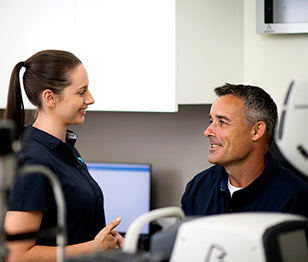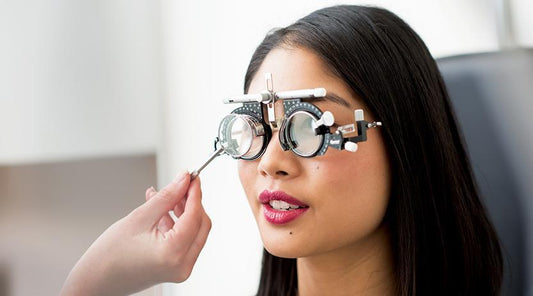Getting ahead of your prescription changes

The eyes may be the window to the soul, but they’re also a great indicator of your health. Our vision changes for many reasons - here are some you need to think about.
Getting older
As you get older, your eyes become less able to focus, which can make reading tricky. The condition is known as presbyopia and it’s caused by the lens in your eye becoming harder and less flexible.
Don’t panic - it’s natural. “It’s basically due to our eyes changing with age,” says Bupa optometrist Karen Makin. It tends to worsen from the age of 40 until you reach 65. It can mean you’ll need progressively stronger prescriptions for glasses or contact lenses for reading.
Pregnancy
It might seem strange, but some pregnant women find their glasses or contact lenses aren’t as effective as they were pre-pregnancy. The culprit? You guessed it: hormones.
“Hormones during pregnancy can cause build-up of fluid in the cornea, which is responsible for a lot of the refractive power of the eye,” says Makin. “This can affect your vision and cause a change in your prescription.”
What tends to happen is that vision returns to its pre-pregnancy level after the baby is born and hormones go back to their normal levels.
Macular degeneration
You’ve probably heard of macular degeneration - a progressive disorder that causes damage to the part of the eye that helps us focus, and it can mean needing a new prescription.
“Macular degeneration will often cause a change in prescription, but we might not get you up to the same vision that you had previously because of the impact of the disease,” says Makin. So it’s best to check in early.
Cataracts
Cataracts are the clouding of the normally clear lens of the eye - and they can really affect your vision. Updating a glasses prescription is usually enough to manage symptoms such as blurred vision in the early stages.
The good news is you can elect to have cataracts surgically removed, and it usually means you’re back to great vision – “sometimes even better than before you had cataracts!” says Makin. That said, some people still need glasses going forward.
Diabetes
If you’re having trouble with your vision or prescription, it could be a sign you may have diabetes. “People can notice a big change in their vision,” says Makin. “Sometimes we might not see any signs of diabetes – all we see is a change in the prescription.”
Once your diabetes is under control, Makin says your eyesight often improves and your prescription goes back to what it was before the diagnosis.
Medications
Some medications for conditions like diabetes and stroke can cause blurred vision. If you’re worried, it’s worth chatting to your optometrist about what can be done to help, says Makin. It can be a good idea to talk to your GP about whether your medication can be adjusted.

We're here to help
Speak to your Optometrist if you have any questions, or book an appointment today.
You might also like to read...
View all-
Do I need an eye test?
Having regular eye tests can help identify and solve any vision problems, and they're a great way to get ahead of any underlying issues.
Eye testDo I need an eye test?
Having regular eye tests can help identify and solve any vision problems, and they're a great way to get ahead of any underlying issues.
Read more -
What should I expect during my eye test?
When you first have an eye test, your optometrist will get the lowdown on your eyes, vision, health and lifestyle in order to tailor the test to you.
Eye testWhat should I expect during my eye test?
When you first have an eye test, your optometrist will get the lowdown on your eyes, vision, health and lifestyle in order to tailor the test to you.
Read more -
Eye tests and out-of-pocket expenses
Worried about the costs of getting your eyes tested? We’ve got good news. They’re usually bulk-billed if you’re covered by Medicare.
Eye testEye tests and out-of-pocket expenses
Worried about the costs of getting your eyes tested? We’ve got good news. They’re usually bulk-billed if you’re covered by Medicare.
Read more





